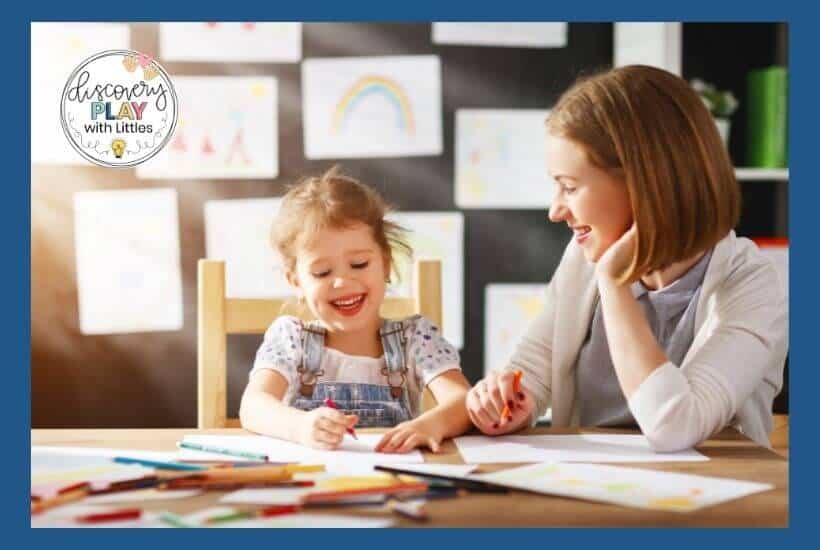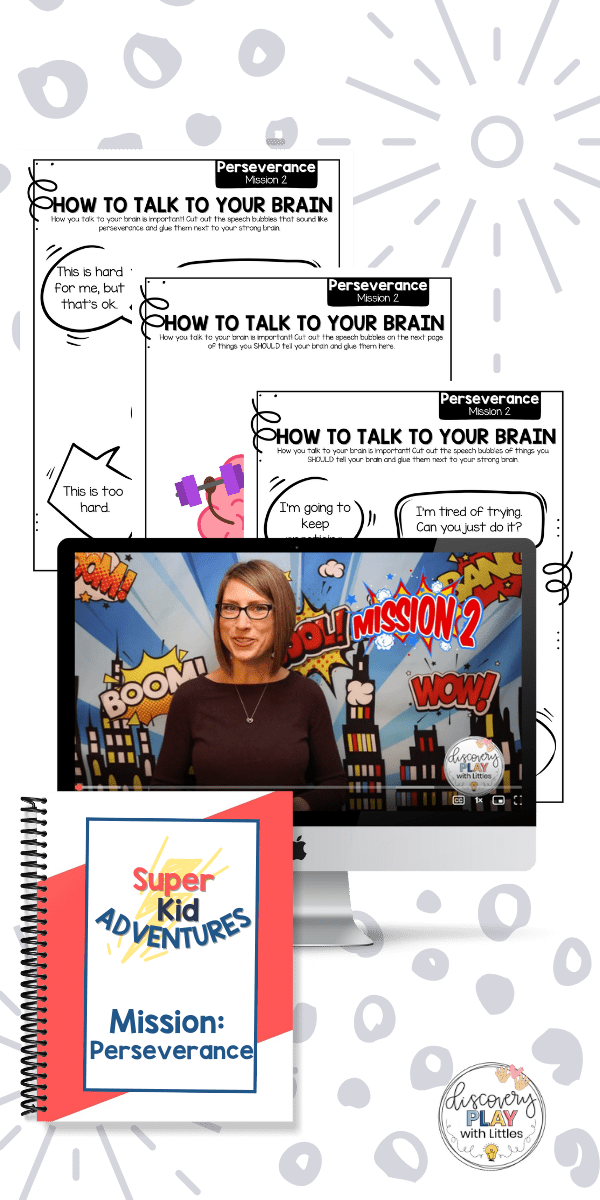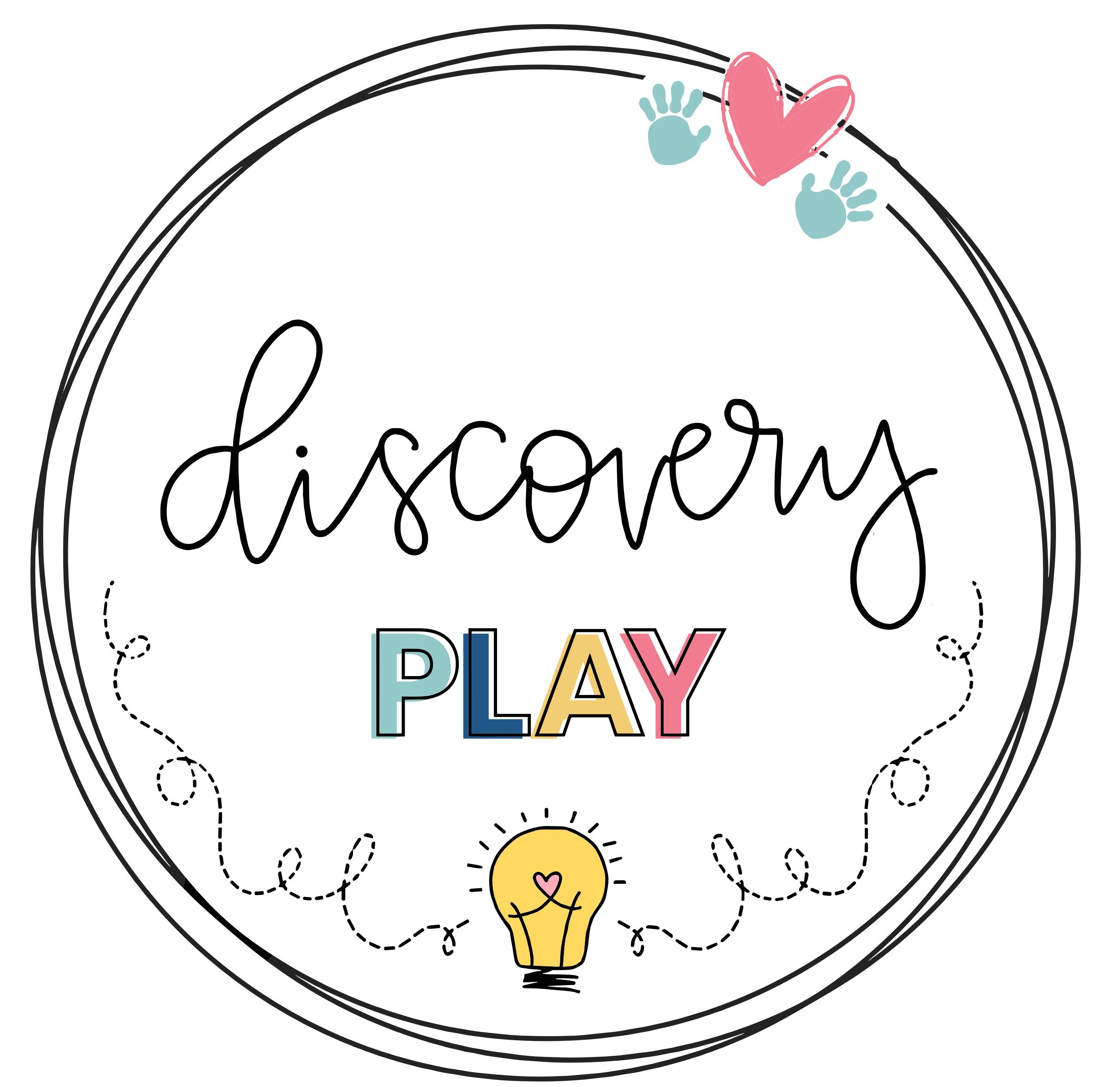She had been sitting at her table crying for almost 20 minutes. We were far enough along in kindergarten that I wasn’t going to swoop in and solve her problem immediately.
Happily water coloring, the rest of the class was obvious to the drama unfolding at the red table.
The kids were supposed to share a cup of water for their paints, and Ella’s partner had put their shared water on the side opposite of where she sat. Not on purpose, he was just excited to get started. Instead of asking him to move the water, she chose to sit and cry.
Kids at her table exchanged confused looks- what’s the big deal? Why is she crying…again?
This happened many times throughout different activities. She struggled with problem-solving and personal responsibility.
Was Ella prepared for kindergarten? Not exactly. She knew most of her letters, and academically with a little extra help and some hard work she was keeping up, but there were many gaps in the skills that would really make her ready to thrive.
The US Department of Education found that 6 out of 10 kindergarteners are unprepared for kindergarten.
Standards have risen since I’ve been in kindergarten. Kindergarten now is what used to be first grade, and unless parents have a child who has been in kindergarten recently, are unaware of the drastic differences.
This leaves many people wondering “How do I prepare my child for kindergarten?” It’s like we are telling parents they have to make it to the finish line…but we aren’t telling them where the finish line is.
Is it knowing colors and numbers? Letters? Sounds? Should kids be reading and doing addition before kindergarten? What will truly set children up to be ready to thrive?
The Difference
There are many things you can do to prepare your child for kindergarten. You can easily get your hands on countless worksheets, activities, or flashcards.
Research shows that worksheets and flashcards aren’t as effective as playing. Kids learn best through play. That’s great, but it is also more difficult for parents to come up with learning games and activities, especially if they don’t know where they are headed and what the goals are.
In my kindergarten classroom, I have two types of students in August. I have the kiddo who comes in, knows the difference between letters and numbers, is able to listen and follow directions, and shows basic responsibility and kindness.
This child is able to begin building friendships, understand and start to learn academic concepts, and grow in problem-solving, self-awareness, and empathy. This child is confident and comfortable in a new environment.
The unprepared child struggles. Unfortunately, 75% of kids who start kindergarten off behind will never catch up with their peers.
Despite if they have gone to pre-school or not, the unprepared child cannot recognize their name, let alone the letters in their name. This makes finding their locker, mailbox, folder, bag of books, toolbox, etc. very difficult.
They immediately feel self-conscious because they know everyone else understands things they do not, and school is not fun. They may or may not even know what a letter is, and have no concept of numbers or counting.

What is required at the beginning of Kindergarten?
No academic skills are required to be mastered before kids enter kindergarten. And…a child who is unprepared will be overwhelmed. An overwhelmed child will have a difficult time thriving.
The child who begins kindergarten unprepared isn’t unprepared because the parents don’t care, or don’t want to put in the time to help their child.
Children are coming into kindergarten more and more unprepared because kindergarten has changed so much since we (the parents) have been in kindergarten, parents honestly have no idea what they are about to encounter.
The big question is: Even though nothing can be required, how can you be sure your child is prepared for kindergarten? Worksheets? No. Hours at the kitchen table doing activity books? Definitely not. Hours drilling your child on academic skills? No thanks. It is much simpler than all of that.

Are you tired of hearing “It’s TOO HARD!” followed by a meltdown?
Using this one simple phrase you’ll get in this powerful lesson, you’ll not only be able to help your kiddo not give up but you’ll:
>Activate their superpower of perseverance so that they can turn around a meltdown and keep trying
>Inspire them to use perseverance…even when it’s hard
>Teach them to recognize the warning signs of giving up, and how to turn it around by taking control of their choices.
Grab your powerful FREE video lesson to teach your kiddo one of the most powerful keys to perseverance.
How can you get your child “ready?”
There are many different aspects of being “ready” for kindergarten that you can work on with your child. Kids need to work on
- Academic skills
- Social skills
- Emotional skills
- Fine motor skills
- Self-help skills
That’s a lot to manage, especially for a working parent or a parent with multiple children.
Our simplified guide in When to Teach What will help break this down into developmentally appropriate stages.
What’s the most important way to prepare your child?
The most important thing you can do to help prepare your child for kindergarten (starting from birth) is also one of the easiest. Read. If you are only going to do one thing to help your child with kindergarten readiness, read. I’m sure you’ve heard it before, but it makes a difference.
One of my favorite quotes is
“Children are made readers in the laps of their parents.”
– Emilie Buchwald
You teach your child to love reading by reading with them. Reading introduces new vocabulary, word patterns, rhythm, rhyme, new concepts, and a love of reading.
Children who are read to daily are more prepared to sit and listen, understand stories, they are better readers entering kindergarten, and have better comprehension skills and social skills.
Starting from birth, I read to my son. I spent the majority of my maternity leave snuggling with him, reading any picture book I could find. As he grew, he loved looking through board books. That was a great way to teach him about feelings, parts of his body, colors, shapes, counting, etc.
What if my child is “too busy” to sit and listen?
Around 2 years old, it gets very difficult to sit and read because toddlers are constantly on the go. Read anyway. Toddlers can play with blocks, pet the dog, play with trains, run in circles, but read anyway. They are still listening to the story and sometimes will even take a break to come look at the pictures.
Reading has many benefits…
People constantly comment on my son’s vocabulary, or ability to understand the world around him. I guarantee it is because we spent so much time reading books. Not only does this give him an academic advantage, but all of that time snuggling together, getting positive attention from mommy or daddy also strengthened our relationship.
I know it’s not always possible to sit and read for hours at a time. Make it a habit to read 2-3 books before bedtime. This is a great way to calm down, give your child some individual attention, and instill a love of reading.
There’s so much to work on before entering kindergarten, it’s difficult to know where to start. All parents feel the same way. Preschool is a great start, but not always enough.
By the end of the year, Ella was starting to problem solve on her own. If she couldn’t find a pencil, she was able to figure it out. She made enormous progress, but she could have been light years ahead of where she ended up had she been a little more prepared for what she would encounter in kindergarten.
You May Also Be Interested In:
When to Teach What: A Guide to Teaching Your Child
Your Turn
What are some things that you are doing at home to help prepare your child for kindergarten?
